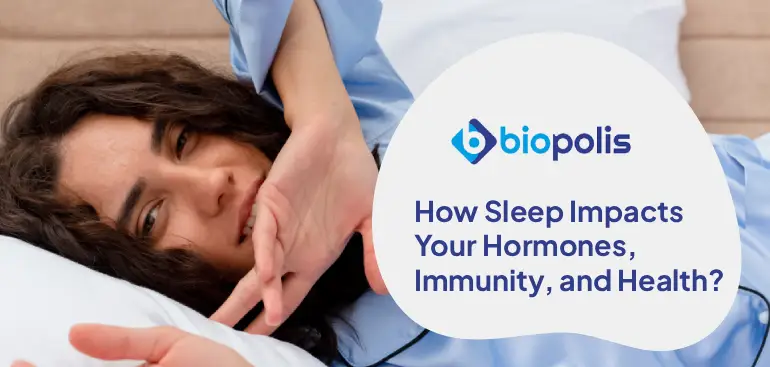Subtotal ₹0.00
Today, it’s generally believed that sleep is sacrificed to fulfil work schedules, night-outs, or just work-side continued scrolling on social media. Not just rest, sleep is an important biological process for hormone regulation and immune system strengthening, which contributes to an individual’s well-being. With sleep neglected, you can really put these processes awry, tiredness, sickness, and maybe health consequences in the long term.
Science of Sleep and Hormone Balance
The body secretes and balances various growth, metabolism, and appetite during sleep. For example, growth hormone, a hormone that encourages tissue repair and muscle growth, is released mostly during deep sleep. The production of this hormone decreases when sleep is interrupted, which slows down the recovery and makes one feel more fatigued.
Cortisol, another important hormone which is commonly referred to as the stress hormone, has a natural rhythm whereby it is highest in the morning to make you wake up and lowest level at night to get your body ready to sleep. Anxiety, weight gain, high blood pressure, and even insulin resistance may be caused by elevated cortisol.
This hormonal imbalance frequently leads to overeating and weight gain, even if your diet hasn’t altered substantially.
Sleep and Immune Function: The Body’s Natural Defense
When the body sleeps peacefully, it secretes immune system proteins, which fight infection and inflammation. Such hormones not only enhance the immune defenses, but also help in repairing stress or environmental toxin-damaged tissues and cells.
By cutting corners on sleep, the production of the immune system is reduced, making you more susceptible to viruses, infections, and delayed recovery from a sickness. This is the reason why individuals who do not focus on taking adequate rest are more likely to contract colds or flu.
In simple terms, one of the most natural and effective methods to boost your immunity is to have good sleep without any prescription.
The Connection Between Sleep and Overall Health
The benefits of getting enough sleep are not limited to hormones and immunity; it influences virtually all areas of your physical and psychological health. Regular high-quality sleep enhances memory, attention, and emotional control. It improves the health of the heart, blood pressure, and heart rate on the one hand, and metabolism preventing the occurrence of obesity and diabetes, on the other hand.
However, on the contrary, chronic sleep deprivation has been reported to cause various health-related disorders like high blood pressure, depression, lowered immunity, and even high susceptibility to heart diseases. In the long run, irregular sleep may cause aging of the body, resulting in dull skin, low focus, and mood disturbances.
How Much Sleep Do You Really Need?
Although the amount of sleep required differs by individual, the majority of adults require 7 to 9 hours of quality sleep per night. Children and teenagers typically require additional resources to assist their growth and development. The quality of one’s sleep is more important than the quantity of sleep.
Tips for Improving Sleep Quality
- Maintain a Routine: Go to bed and wake up at the same time every day, even on the weekend.
- Create a Sleep-Friendly Environment: Keep off screens at night.
- Limit Caffeine and heavy meals: Do not consume caffeine or heavy foods at night.
- Keep Moving: Exercise helps you sleep better, just not so close to bedtime.
- Relieve Strain: Deep breathing, meditation, or reading can help one unwind.
A good sleep can give your body a chance to regain hormonal balance, boost the immune system, and refresh both mind and body every night. Rest not only enhances your performance daily, but also the health and resilience of your long-term health.
When the culture of being busy all the time is glorified in the world, you must remember that being well starts with something as simple and as powerful as getting a good sleep.




Comments are closed